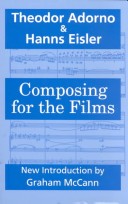Athlone Contemporary European Thinkers S.
2 total works
In this classic work, Adorno revolutionized music theory through an analysis of two composers he saw as polar opposites, Arnold Schoenberg and Igor Stravinsky. Philosophy of Modern Music presents a profound study of key musical works of the twentieth century. But it is more than this because, as always with Adorno, a wide range of social and cultural questions are brought to bear on the analysis. In many ways, Philosophy of Modern Music is a product of Adorno's exile in the United States, where he wrote the book while National Socialism fell apart in his European homeland.
This classic account of the nature of film music aesthetics was first published in 1947. Its value comes from a unique combination of talents and experience enjoyed by the book's authors. Eisler's time at Hollywood gave him a particular insight on the technical questions which arise for composers when music is used in the production of films, while Adorno was able to contribute on wide aesthetic and sociological matters as well as specifically musical questions. Above all, the authors envisaged the book as a contribution to the study of modern, industrialized culture, and, in this respect, it has a particular importance to the whole area of cultural studies.

